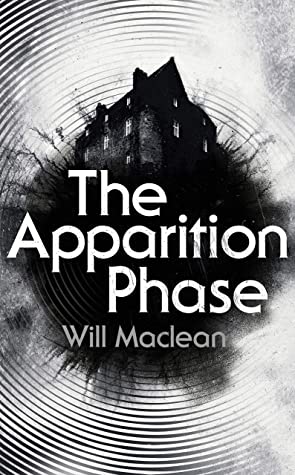Ghosts, creaky old mansions, seances, and the 1970s, are the surface level features of The Apparition Phase (2020), the debut novel from Will Maclean, a ghost story that straddles the line between the paranormal and the rational. However, its eye goes deeper, into the consequences of traumatic experiences, exploring how the past can haunt us, materialising in inconceivable ways.
Tim and Abi Smith are an odd pair of twins; thirteen, practically inseparable, precocious, and obsessed with the unexplained and the macabre. Rather than hang around with other kids their age, they spend their time unattended in the attic, a free space in which they indulge their Fortean interests. It’s a far more engaging world to shelter within compared to the humdrum suburbia outside. But standing stones and monsters aside, there’s one thing they like more than any other.
Ghosts were, however, a perennial fascination for us, and there was nothing we didn’t know about the Drummer of Tedworth, or The Screaming Skull of Bettiscombe Manor, or the Poltergeist of Borley Rectory, and a hundred other strange and peculiar stories. We kept scrapbooks. We swapped opinions, and we wrote earnest monographs on scrap paper. We were experts.
As self-declared experts, and finally in possession of a camera, they concoct a plan to fake a ghost photograph, a hoax that may one day reach the infamy of the Cottingley Fairies. Sharing their mocked haunting, complete with invented backstory, they receive an unexpected outcome, and the prank soon spirals out of control, bringing about unforeseen circumstances, and exchanges that will reverberate down the years, especially after the early disappearance of Abi as fears grow and days pass.
Children and teenagers went missing all the time, the papers were always full of such stories, and the narratives, as far as I knew, always went the same way, without exception. A child went missing. A family was distraught. There was a space of time – a week, two weeks, a month – where the hope that they might turn up alive burned and guttered like a candle. After a time, and usually not very much time, a body would turn up. And that would be the end.
This is Tim, looking back from the present day, telling “the story of how I ended up having what I can see now was some kind of nervous breakdown” and describing the aftermath of the prank with added layers of reflection and hindsight. His tone is measured, clinical, no doubt due to his brokenness; however his memory, in many ways, is photographic. Certainly no detail seems to have escaped his teenage eyes and degraded in his middle-aged mind.
The attention to detail does have its positives, as Maclean reconstructs the seventies through what was on telly, magazines, crude contemporary graffiti and the like, but rather than slap it on thick, as if trying to out-70s the decade itself, he prefers to sprinkle little touches here and there, usually doing so with some humour, whether recalling the general exoticism of wine and chilli con carne at the time or bringing to mind how less-instant our world once was, such as “when we went to collect the pictures from Boots a fortnight later”.
The opening half of the novel is definitely the stronger section, its relaxed reconstruction of an ordinary 1970s England, slow-paced and suburban, setting the stage for a potentially less prosaic horror to appear. Most enjoyable is the dynamic between the characters, especially the family as Abi’s prolonged disappearance take its toll on each of them in different ways, distancing, drink, and dreams (“If my parents heard me scream, they didn’t mention it.”), and the impact these effects have on their withering exchanges.
The second half is less interesting, but still enjoyable, as Tim recalls a week spent, along with some others around his age, at Yarlings, an old country house (“a patchwork place, where the tectonic plates of different eras met and ground together unhappily”) which moves The Apparition Phase away from a suburban fake ghost story and into riffs on ghost-hunting with seances, atmospheric recordings, and all manner of bumps-in-the-night thrown in for that most perfect of settings: the haunted house.
It seemed that, no matter how bright the day outside, the interior of Yarlings was always dark, always gloomy, always permeated with a troubled air, as if overthinking its presence.
What Maclean does in The Apparition Phase is walk the line between mild horror and a more rational world, his smoke machine puffing out creepy goings-on that, when the mist clears, are ambiguous enough to entertain explanations either way. But the true ghosts may be those of the past, continually gnawing on the mind for answers. When one of Tim’s ghost-hunter friends asks the following, it’s a question that refers to events in the book but echoes the burden of loss:
“Did it ever cross your mind that haunted houses aren’t haunted unless there are people in them?”
It’s an invitation, in a way, for Tim to face his attraction to ghosts and later, in the light of the modern day, the lovely epilogue rounds out the novel in a touching way with a few callbacks to earlier episodes. Despite having some doubts over the narrative total recall, The Apparition Phase is an enjoyable and well-paced tale of growing up in the aftermath of traumatic events, with licks of horror, even if it’s not particularly leave-the-light-on-after stuff. But for those seeking a ghostly tale with literary bent then this may be just the tonic, served up, of course, with appropriate spirit.
